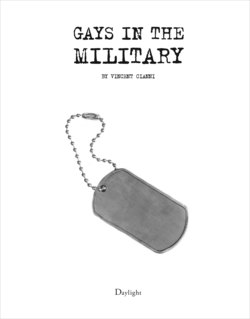Читать книгу Gays In The Military - Vincent Cianni - Страница 14
На сайте Литреса книга снята с продажи.
ОглавлениеMARQUELL SMITH, CHICAGO, IL, 2010
SERGEANT, U.S. MARINE CORPS, 2000–2006
General discharge under honorable conditions; command made assumption about sexual orientation and having AIDS
I had been in the Marine Corps two years, through two duty stations. My commanding officer respected me and he valued what I had to say. I received the highest performance evaluation that this major had ever given any Marine sergeant. He made me want to be an officer. I applied for the Enlisted Commissioning Program and got selected in October 2005.
I was dating a Marine but we had broken up. I got a call from the persons that he was currently dating to tell me my ex was HIV positive. I called my ex and asked him, “What’s wrong with you?” He says, “I’m positive.” I said, “May God have mercy on your soul” and I hung up the phone. I felt incredibly hurt and I certainly believed that I was HIV positive because we were not using protection. There was no reason not to think so. I went on base to go get an HIV test. It took two weeks to get a response back. I was anxious and didn’t know where to go off-base to talk to someone about what was going on and in a moment of weakness, I walked into the first sergeant’s office. I didn’t know anything because of the Don’t Ask, Don’t Tell policy. I was almost in tears.
When I walked out of his office, he said he was going to help me and I believed him. My ex had told me that my command called his command, and they were out to get me. I remember getting a call from the first sergeant: “The major said they don’t want this in the officer corps. He said you could stay enlisted, but you can’t be an officer.” I said, “Well, you tell the major he’s going to have to prove it.” They were unwilling to do any investigation. The first sergeant provided a statement that said I was gay and I had sex with both men and women. We never had any conversation about who I was having sex with. He made three different statements, all of them inconsistent. My attorney did everything to fight this, but despite that, they still decided to discharge me.
I asked to be removed from the command because I was concerned about my safety. It got to a point where I was walking around with a recording device. I had a number of conversations recorded that indicated that something funny was going on. The first sergeant had inappropriate conversations with me; I could prove the major was coercing him. I don’t have those recordings because from a legal standpoint, should I have brought those up, I would’ve been in trouble for wiretapping. I was very worried. No one would protect me and so I ended up not saying anything at my board hearing. I ended up writing a statement indicating that I had made no affirming statements to the first sergeant regarding my sexual orientation.
I was discharged on July 17, 2006: general discharge under honorable conditions—for one reason only, because I fought. I felt I had served impeccably my entire career and the outcome should be no different. When I walked off of that base, I cried. I cried not because I was sad; I cried because I finally felt what freedom was like.
My ex is still serving. He was never discharged or investigated. His command determined it was hearsay. My command determined it was sufficient evidence. Here’s the irony in all of that. My first sergeant and my commanding officer were both African American. I absolutely understand what it took for both of them to be where they are. I remember the first sergeant discouraging me from the commission because he said that there was no room for us there. I can understand that homophobia in the African American community is so deeply entrenched and had huge implications as to why they did this. I think the last thing that anyone wanted to see was that I be commissioned as this gay African American officer.
I always wanted to be an officer. I think being African American had everything to do with why I fought. I felt that so many people told me what I couldn’t do and I wanted to show everyone what I could do. I had family members that told me I wouldn’t make it. Did I do it to prove people wrong? Maybe. Did I have days where I wanted to walk away? Absolutely. At some point, something happened. I came under some great leaders, and something happened where I literally wanted to be the best that I could be. I wanted to be Marine Corps.
I felt that in my darkest hours, the Marine Corps turned their back on me. After I got out, I wouldn’t even discuss having been a Marine. I needed to grieve; acknowledging I was a Marine was difficult. I talked to some of the greatest leaders after I got out. The same gunnery that asked me to come work for the sergeant major in the Marine Corps said to me, “It’s not everyone in the Marine Corps, it’s just individuals. Always remember that.” And she was right, it’s just individuals.
PAGE 49
